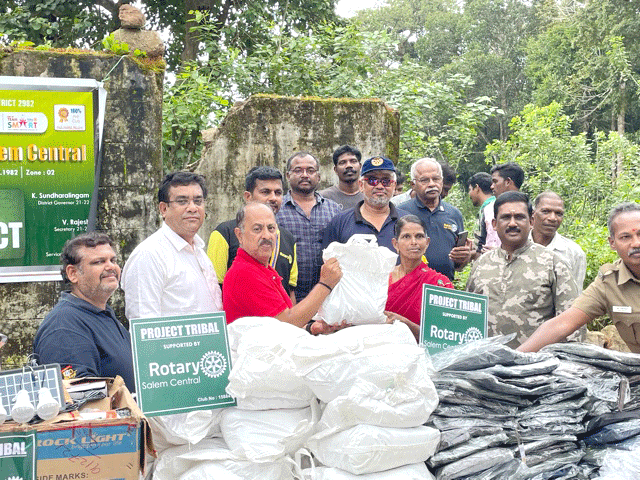When forest ranger Manikandan briefed RC Salem Central (RID 2982) past president Sureshkumar about the plight of Koomati tribals in Valparai taluk, the club members did not have any clue about the daily hardships faced by this primitive community living at the Anamalai Tiger Reserve, a protected habitat for wild animals and endangered species. “Soon, we received a letter from the ranger detailing the pitiable conditions of 36 tribal families living in Komati settlement at the tiger reserve. The government has not provided power supply or concrete houses to them as they live in a protected wildlife zone,” says PDG R Vasu, ARRFC.

Following the letter, a four- member fact-finding team led by Vasu visited the tribal hamlet, 65km from Pollachi. “We interacted with them to shortlist their basic needs and know what can be done to make their life easier. Power supply and houses are prohibited in this wildlife habitat. Hence, we decided to install solar streetlights and solar lamps in their mud huts,” recalls Vasu. After the survey team went back, the club gave shape to its tribal upliftment project by working on the details.
A 2,000-litre water tank was installed and pipelines were laid from the high mountains to draw water and provide the last mile connectivity to tribal huts so that they can have running water from the storage tank. “With 20 solar streetlights and a solar lamp at each hut, now they have adequate lighting and need no longer fear being attacked by tigers and other wild animals. These lights have removed darkness from their life,” smiles Vasu. But the tribals have to walk 12km to either Valparai or Topslip, a part of Anamalai mountain range and a wildlife sanctuary, to earn their livelihood by doing menial jobs. “There is no possibility of road transport as it is a dense forest with strict law enforcement.”
DG K Sundaralingam, along with 10 Rotarians including club president Tamil Mohan, secretary Rajesh, Vasu, PPs K Rajendran and Sureshkumar, visited Koomati and donated a range of essentials including 100 raincoats, two cooking vessels to each family, sleeping mats, bedsheets, grocery bags worth ₹1,000 each, and 100 vegetable seed packets. “We will be taking up minor repairs of the huts soon. But we can’t provide houses which are banned in this location,” says Vasu. The tribal upliftment project costing ₹3.5 lakh will be replicated in 16 more places with the support of RID 3203, at an estimated cost of ₹45 lakh. “The funding will be a mix of global grant and member contributions. We will complete this entire project before the next Rotary year.”
Thanksgiving Day
All the 36 families sported happy faces and were beaming with joy at a thanksgiving meet hosted by the beneficiaries. “Now there is no darkness in our daily life. Our hut is clean, there is running water and we sleep on good mats,” said Mani (60), tribal chief. But their hardships are far from over. Each tribal gets a daily wage of ₹200 for three months a year and free rations from the government. “But their basic needs are not yet met and they continue to lead a very primitive life,” adds Vasu.





